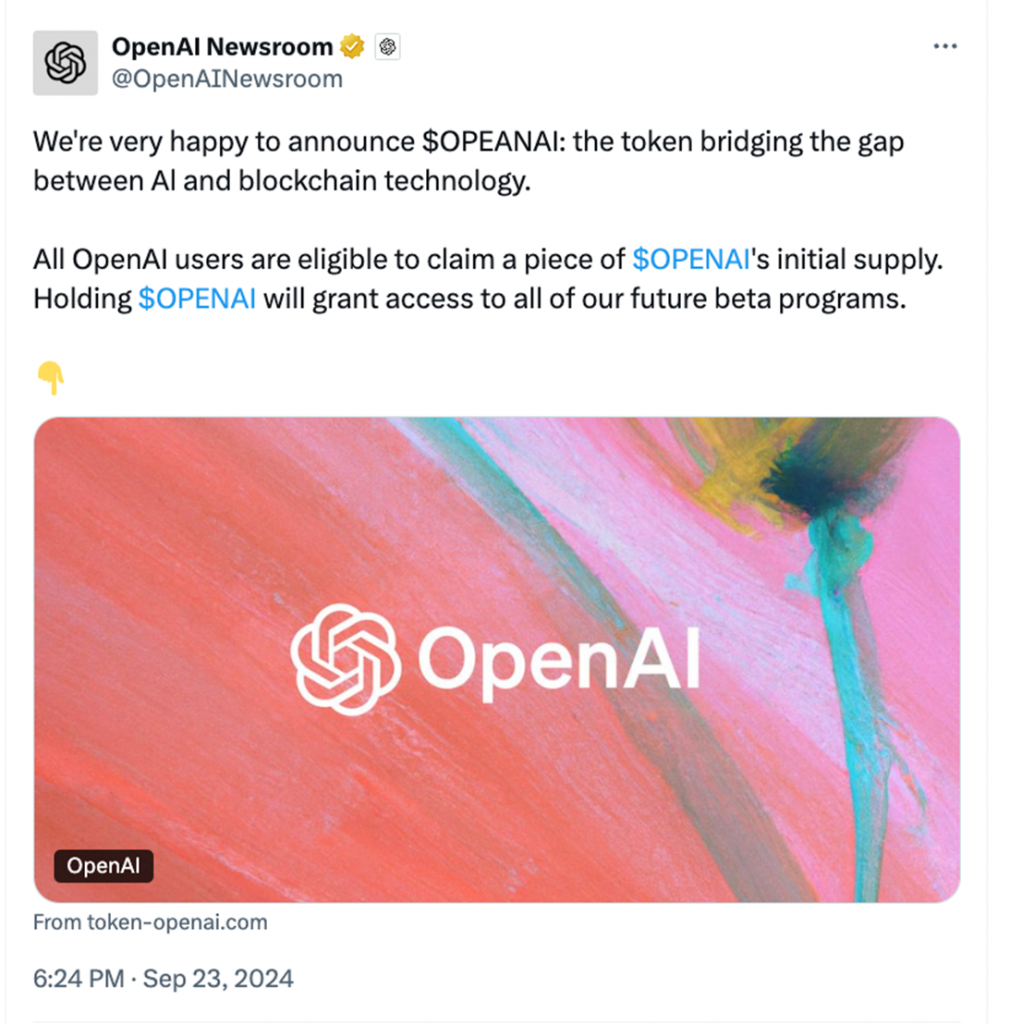Friend
Professional
- Messages
- 2,675
- Reaction score
- 987
- Points
- 113
How can pressing just one button lead to irreversible consequences?
OpenAI's official account on the X social network was recently attacked by scammers specializing in cryptocurrency schemes. This incident continues a series of similar hacks that have previously affected the personal accounts of the company's management.
On the evening of September 23rd, a message about the new blockchain token "$OPENAI" appeared on the OpenAI Newsroom page. The post contained information about the possibility for OpenAI users to receive part of the initial token offering, which will allegedly provide access to the company's future beta programs.

However, in reality, there is no $OPENAI token. Comments in the post were disabled, and the link led to a phishing site imitating the official OpenAI resource. The attackers used the 'CLAIM $OPENAI' button to attempt to gain access to users' cryptocurrency wallets. Subsequently, the post was deleted, there was no official comment from the company's representatives.

This is far from the first time that accounts associated with OpenAI have been compromised. So, in June 2023, the account of the company's CTO Mira Murati was used to promote a fictitious token with the same name - $OPENAI. And three months ago, the accounts of chief researcher Jakub Pachocki and researcher Jason Wei were subjected to a similar attack.
According to Coinspeaker, which was the first to report on last year's hack of Mira Murati's account, the attackers used a cryptodrainer that allowed them to redirect NFTs and tokens of victims to the attackers' wallet after logging in to a fake site.
In recent years, cryptocurrency scams have become more and more common. According to the FBI, Americans lost $5.6 billion in 2023 due to such schemes, which is 45% more than in 2022. The first half of 2024 shows that the situation could get even worse, with more than 50,000 fraud cases already registered, with a total loss of about $2.5 billion.
The incident with the hacking of the official OpenAI profile highlights the importance of user vigilance and the need to verify the accuracy of information, especially when it comes to financial transactions on the Internet and large public accounts that suddenly start advertising suspicious crypto schemes.
Source
OpenAI's official account on the X social network was recently attacked by scammers specializing in cryptocurrency schemes. This incident continues a series of similar hacks that have previously affected the personal accounts of the company's management.
On the evening of September 23rd, a message about the new blockchain token "$OPENAI" appeared on the OpenAI Newsroom page. The post contained information about the possibility for OpenAI users to receive part of the initial token offering, which will allegedly provide access to the company's future beta programs.

However, in reality, there is no $OPENAI token. Comments in the post were disabled, and the link led to a phishing site imitating the official OpenAI resource. The attackers used the 'CLAIM $OPENAI' button to attempt to gain access to users' cryptocurrency wallets. Subsequently, the post was deleted, there was no official comment from the company's representatives.

This is far from the first time that accounts associated with OpenAI have been compromised. So, in June 2023, the account of the company's CTO Mira Murati was used to promote a fictitious token with the same name - $OPENAI. And three months ago, the accounts of chief researcher Jakub Pachocki and researcher Jason Wei were subjected to a similar attack.
According to Coinspeaker, which was the first to report on last year's hack of Mira Murati's account, the attackers used a cryptodrainer that allowed them to redirect NFTs and tokens of victims to the attackers' wallet after logging in to a fake site.
In recent years, cryptocurrency scams have become more and more common. According to the FBI, Americans lost $5.6 billion in 2023 due to such schemes, which is 45% more than in 2022. The first half of 2024 shows that the situation could get even worse, with more than 50,000 fraud cases already registered, with a total loss of about $2.5 billion.
The incident with the hacking of the official OpenAI profile highlights the importance of user vigilance and the need to verify the accuracy of information, especially when it comes to financial transactions on the Internet and large public accounts that suddenly start advertising suspicious crypto schemes.
Source
